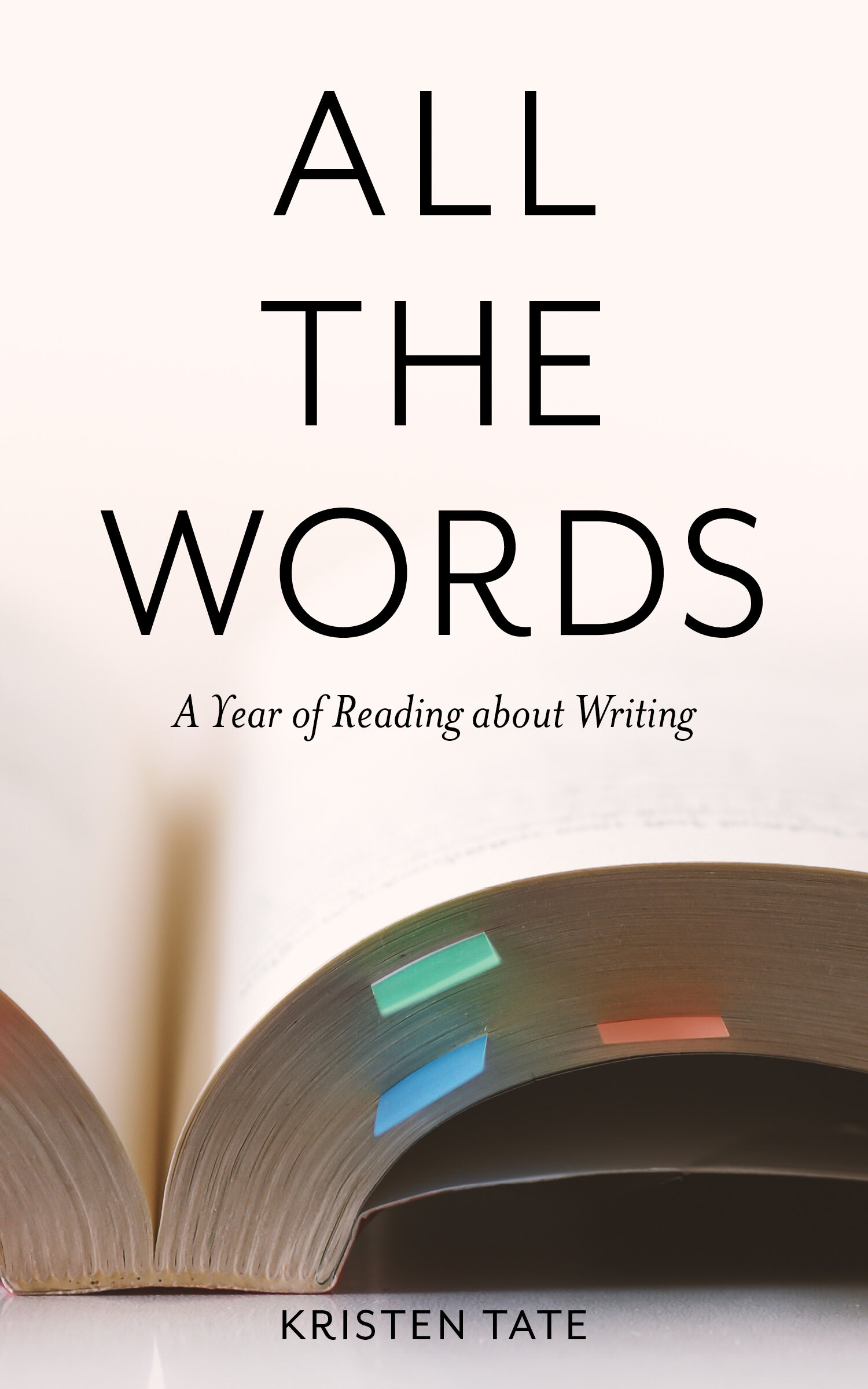Brian Shawver, The Language of Fiction
This is part of a series of weekly reviews of writing craft books written in 2019, later revised and collected in Kristen’s book All the Words: A Year of Reading About Writing. Read the first chapter or buy the book in our Shop.
It is week twenty-four of 2019. How did the writing go for you this week? Here at the garret, I was still recovering from my bout with pneumonia, which meant that only essential work got done. The newsletter made the cut this week, but I had to throw out several pounds of cherries that I had planned to use to make jam. I thought a lot about the lost cherries this week and realized that they are a good metaphor for something that happens at a late stage in the writing process, so bear with me for a moment while I tell you more.
We went and picked these cherries ourselves the day before I came down with pneumonia. It was a foggy day in the city, and we got in the car and drove an hour or so deep into the East Bay, where it was sunny and warm. We had a picnic and spent a happy hour picking and eating cherries. That night, my partner and I got to work on the stemming and pitting. In a couple hours, we managed to get through about half of our haul.
I love this kind of work, and I love the jamming too. You need some space in the kitchen and some uninterrupted time, but the work itself is straightforward and enjoyable once you have confidence in what you are doing. Boil the fruit with some sugar until it thickens, ladle it into clean jars, top with seals and bands, and give them a hot water bath to seal them. The kitchen smells heavenly, there is fruit foam skimmed off the top to eat, and at the end you have a row of gorgeous shining jars of homemade jam cooling on your counter. I can even manage it on a weeknight if I order pizza and keep everyone out of the kitchen.
I thought I’d finish up the pitting on Monday and then be ready to jam later in the week. But Monday night I went from feeling mildly off to feeling feverish and exhausted. I put myself to bed and then didn’t get out again except for essential tasks for the next three days. The pitted cherries moved to the freezer, and the unpitted cherries got dumped in our giant pasta pot and moved into the fridge.
My partner came down with pneumonia, and then one of my kids. That giant pot of cherries sat in the fridge, taking up the space I needed for juice and Gatorade and chicken soup. I didn’t have the energy to pit them; I didn’t even have the energy to try to give them away (would anyone have wanted our plague cherries?). Day after day, they sat there, quietly decaying and taking up room in my fridge and my brain.
Finally this week, I had enough energy to cook dinner again, and I had to confront the cherries sitting in my pasta pot. I got the pot out of the fridge and picked out a few moldy cherries and a few more overripe ones from the top layer. Probably a third of the pot was salvageable if I could pit them and get them into the freezer right then. I had just enough time and energy to do that or to make the homemade dinner I had planned and which we were all craving after two weeks of takeout and frozen food. I couldn’t do both.
I stood there and looked at the pot for a minute. Then I poured all of those damn cherries into a paper grocery bag and carried it down to the compost bin in the garage, washed out my pasta pot, filled it with water, and set it on the stove to boil.
Writers, you are going to confront a similar choice at some point during the writing or revision process. You’ll realize that the prologue you spent so much time laboring over or the character arc that was part of your original dream for your book just isn’t working (sometimes I will be the one to deliver this news), and you’ll have to send it to the metaphorical compost bin. It’s hard to lose the time and creative energy that you’ve already invested in these words, but that’s just how it goes sometimes. Dump the words, wash out your pot, and then move forward with the work that needs to be done right then to finish your book. Don’t get stuck at the decision point or waste your energy on regrets.
Now, on to this week’s book, The Language of Fiction: A Writer’s Stylebook by Brian Shawver. If I’ve exhausted your patience with the cherry saga, here’s the short review: it’s fantastic, and I think any fiction writer interested in learning more about how sentences work and how they can improve their own should take the time to read it.
As Shawver points out, The Language of Fiction is not a comprehensive grammar or style book, and I think that turns out to be one of its key strengths. Shawver focuses on the issues that matter most to fiction writers. As he puts it: “Language is the water that all writers swim in, and you need to know your element as thoroughly as you can. But it’s a big ocean, and mastery for a creative writer involves the knowledge of specific currents and swells.”
These currents and swells include the pros and cons of writing in present tense vs. past tense, how to format and punctuate dialogue and portray inner thought, when and how to use dialect in dialogue, how to use the past perfect tense to signal time, how to avoid common problems with dangling participial phrases and verb tense shifting, and when and how to violate grammatical rules about sentence fragments and comma splices.
Shawver includes in-depth grammar explanations only when they are necessary to truly understand the subject at hand, and his explanations are clear and well-supported by examples, both good and bad. Shawver doesn’t have a lot of patience for Strunkian pronouncements such as “Anglo-Saxon is a livelier tongue than Latin, so use Anglo-Saxon words.” Instead, he investigates the logic of such statements and then leaves it to you, the writer, to make the choice best suited to your own work.
Perhaps my favorite chapter, if I had to choose just one, is that on adverbs. I agree with Shawver that this useful part of speech has gotten a bum rap in recent years. Shawver argues persuasively that the strongest argument against adverbs isn’t that “they’re inherently redundant” or “that we can always avoid them by finding more precise verbs or adjectives,” but that “they run the risk of disrupting a sentence’s eloquence, because of the way most of them are constructed.” With care, however, a writer can use the occasional -ly construction with grace and style. As Shawver asks, “You could substitute ‘an extremely weak hamster’ with ‘an etiolated hamster,’ or ‘he walked slowly’ with ‘he perambulated,’ but is that always a good idea?”
Shawver argues that language is “the most manageably mastered of fiction’s mysteries” and suggests that mastery of language can lead to other gains: “Perhaps a control of diction, punctuation, and syntax gives you so many more options for how to say things that you gain access to otherwise inaccessible perceptions.” I think that’s true, and I think that The Language of Fiction can set you on the path towards mastery.
Here’s to mastering the mysteries, y’all,
Kristen
Check out our Resources page for more in-depth articles on writing, revising, polishing, and publishing your novel. Sign up for our weekly newsletter for fresh content, and you’ll also get our free PDF with recommended reading for writers!


